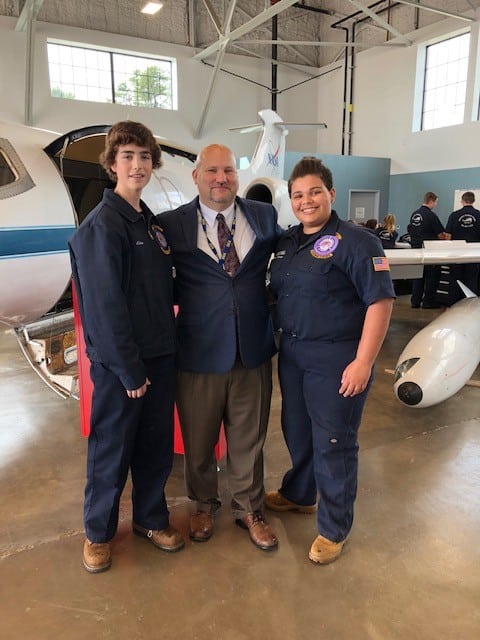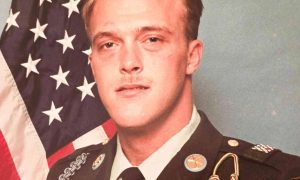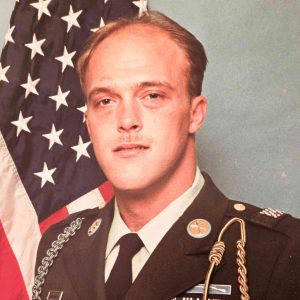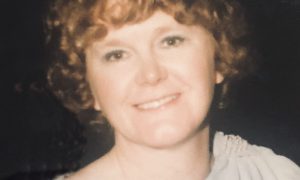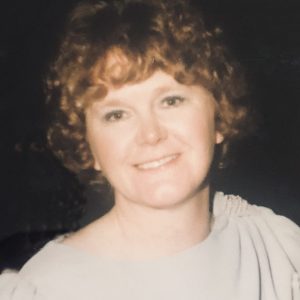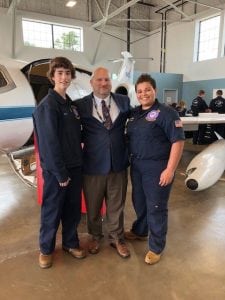
DESE Commissioner Jeffrey C. Riley with AMT juniors Zachary Smith and Faith Young. (Photo by Susan Dargie)
WESTFIELD – New Department of Elementary and Secondary Education (DESE) Commissioner Jeffrey C. Riley and Leldamy Correa, Director of Strategic Initiatives traveled to Westfield on Wednesday for a visit to the Aviation Maintenance Technology program at Westfield Technical Academy. The Commissioner was interested in learning more about the program, which is the only one of its kind in New England, and one of only three FAA-certified high school AMT programs in the country.
AMT sophomores took the group, which included Superintendent Stefan Czaporowski and WTA Principal Joseph Langone on a tour of the shop, where they explained the Air Frame curriculum to the Commissioner, which includes everything except for the engine. They visited the flight simulator room, which captivated Riley; and the metal fabrication shop with four welding stations, where students learn how to bend and mold sheet metal to make parts for the aircraft.
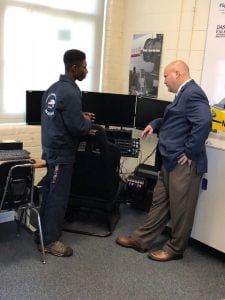
AMT sophomore Alex Blake shows the flight simulator to Commissioner Jeffrey C. Riley. (Photo by Susan Dargie)
Riley said he was impressed by the equipment and by the engagement of the students in the program. “In high school, what kids are most concerned about is the food, and what has this to do with the real world,” he said.
Riley also engaged the students, asking them what led them to join the AMT program, and what their future goals were. In AMT instructor Scott Hepburn’s sophomore class, only three of the thirteen students said they had previous experience being around airplanes.
Sophomore Alex Blake showed Commissioner Riley the various trainers and instruments that the students work on. “It’s quite a privilege. My parents are proud and very thankful,” Blake said about his participation in the program.
They also toured the Pitts room, which currently has an experimental aircraft parked in it. Langone explained that the FAA requires a certain number of hours each year in contact with a live aircraft, one of the reasons they were anxious to get Hangar 2 ready for students this year.
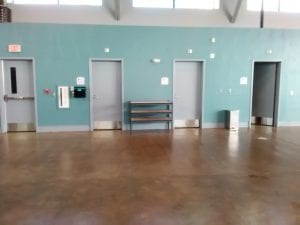
New bathrooms and a new exit were part of the renovations at Hangar 2. (Photo by Amy Porter)
The contingent then traveled to Westfield Barnes Airport, where they met up with Mayor Brian P. Sullivan to tour the newly renovated hangar and meet the junior class, who are learning about engines for the Power Plant curriculum.
Hangar 2 had several aircraft for the students to work on, including a one-engine Piper Cherokee, a Baron B55 Twin Props, a Lear Jet 23 and a couple of experimental aircraft. “Our Piper is the only one that has run smoothly,” said junior Zachary Smith, who led the tour with classmate Faith Young.
“The Baron starts up just fine; it’s just the shutting off we have to work with,” said AMT instructor Steve Dickinson, who teaches juniors and will be teaching the freshmen once they go through exploratory.
The Commissioner asked Smith and Young the same question about their roots in aviation and future goals in the program. “I always knew I wanted to do something in Aviation,” said Smith. He said he had attended the Wright Flight program in middle school for students who want to be pilots.
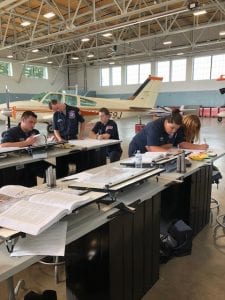
AMT juniors at work at Hangar 2. (Photo by Susan Dargie)
“I originally came to the school for IT,” said Young, who said she also attended Wright Flight in seventh grade, but never thought of it as a career at the time. Now she said she is interested in pursuing her studies in aerospace and engineering.
Smith said another appeal of the program is that when they turn 18, they can earn $25 an hour as an Air Frame mechanic. Czaporowski said there is the potential to earn $75,000 in the first job out of school. Czaporowski also talked about the shortage of mechanics and pilots, another component they hope to add to the program in the future.
Now that the hangar is completed, going forward students will be able to choose the Power Plant or Air Frame track for certification, both two year programs, according to Langone. He said the school is also working out articulation agreements with other programs including Embry-Riddle Aeronautical University in Florida, for students that want to continue their studies with college credit given for their work at WTA.

